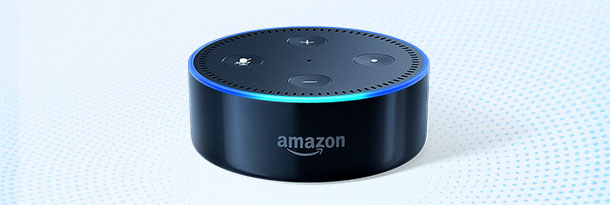New additions to Amazon’s growing ecosystem of Alexa-based products are making a splash at CES this week. With a growing number of home appliance, computer and electronics makers announcing integrations with the company’s digital assistant technology, the transformation to automated homes and home offices appears to be taking place before our eyes.
Among the most notable integrations is Lenovo’s Smart Assistant, which features Alexa’s cloud-based voice technology. Built in collaboration with Amazon, itrecognizes the user’s voice, and performs a variety of functions. It checks calendar appointments, plays music, conducts Web searches and creates lists, among other things.

The assistant is designed to run Lenovo smart home devices and scores of third-party products as well.
Dish Network, which has 13.6 million pay-TV customers, is the first television provider to provide direct integration with Alexa. Dish customers will be able to use its Hopper DVR hands-free with the Amazon Echo and Echo Dot.
Starting later in the first half of 2017, users will be able to search, navigate and quick-play content on the Hopper DVR hands-free, based on show titles, actors, genre and channel, if they have a broadband connection and an Echo or Dot.
“Alexa seems to be a big winner at CES thus far,” said Jim McGregor, principal analyst at Tirias Research.
Amazon last week announced that Echo Dot was its best-selling item, and that Alexa-enabled devices — including the Echo, Echo Dot, Fire TV stick and Fire tablet — were its top-selling items during the holiday season.
“The fact that Amazon is willing to share this technology and is a friendly partner is good for the industry and the company,” McGregor told TechNewsWorld.
Early Days
Amazon has sold more than 5.1 million Amazon Echo devices since it was introduced in late 2014, according to Consumer Intelligence Research Partners.
Consumer awareness of the Echo has soared over the past couple of years, noted Michael Levin, a partner at CIRP. However, this product, which has an available marketplace of 125 million households, is still in its infancy.
“Amazon wants to create Prime members even more than it wants to sell Echo devices,” Levin told TechNewsWorld, “and Alexa could become the operating system for Prime membership.
Industry Smarts
Vivint Smart Home has announced that Sky — which uses machine learning to pick up activity patterns of home residents to help manage energy use and security devices — now accepts voice commands through Amazon’s Alexa system.
Ayla Networks announced that it has added Alexa integration and Alexa’s smart home skills to its Internet of Things platform. Partner manufacturers no longer will have to write complex code or run servers on AWS in order to configure connected products.
“There are a number of rules and tests that every company needs to follow and pass to work with the Smart Home Skills API,” said Oliver Cockroft, a product architect at Ayla Networks
“We have built our Alexa connector with the logic to conform and pass all the tests that Amazon requires for the different device types,” he told TechNewsWorld. “Only by doing this can we truly have a configurable connector, instead of having our customers need to write and manage their own lambda code to integrate with Alexa.”
For example, one of those tests might be making sure a fan turns off automatically if its speed is set to zero, he said.
Ayla’s technology is used for fire safety, water filtration, WiFi-enabled door locks, smart air conditioners and other uses, Cockroft said, but he declined to name manufacturers or consumer partners that have tested Ayla’s IoT with Alexa.
Although Ayla has spoken to other companies about integrating with their digital assistant technologies, he said, Alexa has been the most requested system from customers, and Ayla wants to make sure that it’s fully supported before it commits to other voice interaction platforms.
In addition to providing the Alexa system, Amazon has been “very aggressive at assembling the pieces of an end-to-end IoT service chain” in its AWS cloud, observed Paul Teich, principal analyst at Tirias Research.
“That is a clear service differentiation that dovetails nicely with their natural speech understanding for many consumer and industrial IoT use cases,” he told TechNewsWorld.
While Alexa is well ahead of its competitors, rivals like Google Voice and Microsoft Cortana are progressing significantly, said Charles King, principal analyst at Pund-IT.
Both companies have “substantial partnerships that they will bring to the fore,” he told TechNewsWorld.
Alexa is widely successful, King said, but its capabilities are “far behind muscular, enterprise-class cognitive platforms like IBM’s Watson.”






















































